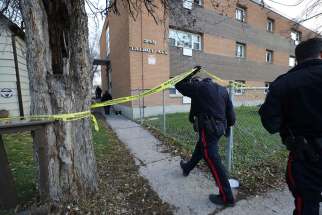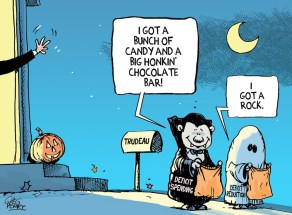Police union demand ignores budget reality
Read this article for free:
or
Already have an account? Log in here »
To continue reading, please subscribe:
Monthly Digital Subscription
$0 for the first 4 weeks*
- Enjoy unlimited reading on winnipegfreepress.com
- Read the E-Edition, our digital replica newspaper
- Access News Break, our award-winning app
- Play interactive puzzles
*No charge for 4 weeks then price increases to the regular rate of $19.00 plus GST every four weeks. Offer available to new and qualified returning subscribers only. Cancel any time.
Monthly Digital Subscription
$4.75/week*
- Enjoy unlimited reading on winnipegfreepress.com
- Read the E-Edition, our digital replica newspaper
- Access News Break, our award-winning app
- Play interactive puzzles
*Billed as $19 plus GST every four weeks. Cancel any time.
To continue reading, please subscribe:
Add Free Press access to your Brandon Sun subscription for only an additional
$1 for the first 4 weeks*
*Your next subscription payment will increase by $1.00 and you will be charged $16.99 plus GST for four weeks. After four weeks, your payment will increase to $23.99 plus GST every four weeks.
Read unlimited articles for free today:
or
Already have an account? Log in here »
Hey there, time traveller!
This article was published 30/10/2019 (2236 days ago), so information in it may no longer be current.
As weekends go, there’s no disputing that Winnipeg’s last one was bad.
By the time the sun rose on Monday, three people were dead and five others were grievously injured, the result of incidents that have once again put the spotlight on the city’s violent-crime rate. A stabbing on Saturday night claimed the life of a 14-year-old girl; two men suffered serious injuries in a downtown back lane early Sunday and later died in hospital; and a shooting Sunday afternoon left four people wounded, including a child under the age of two.
“We’re just seeing people resorting to weapons and violence far too frequently,” Winnipeg Police Service Chief Danny Smyth told the Free Press on Monday. A news release issued by police on Sunday night noted the weekend’s incidents “placed a significant strain on Winnipeg Police Service resources.”
The strain on police resources is, in part, created because situations such as these require the investigative efforts of multiple units at the scene of each violent incident, meaning on-duty police personnel can be stretched dangerously thin as calls for service continue to come in.
What isn’t particularly helpful in the current context is parties seeking to capitalize on the public’s understandable unease, for seemingly partisan purposes.
And in such moments, the WPS could use a little help — in the short term, perhaps a redistribution of resources to cover the gaps created by high demand, and in the longer term, in the form of action by all levels of government to address the systemic and societal factors, such as addiction and the escalating methamphetamine crisis, that are showing themselves to be catalysts for the increase in violent crime.
What isn’t particularly helpful in the current context is parties seeking to capitalize on the public’s understandable unease, for seemingly partisan purposes.
Of particular note was Monday’s statement by Winnipeg Police Association president Moe Sabourin, who noted that “Winnipeg has a serious and out-of-control crime problem, and it will only get worse unless steps are taken to reverse it.”
The steps called for by Mr. Sabourin seem, however, to be limited to boosting the WPS budget in order to increase the number of police officers on Winnipeg’s streets. Those officers would, of course, be additions to the union’s membership.
Mr. Sabourin’s statement criticized city council and, in particular, Mayor Brian Bowman for failing to provide the WPS with the funding increases it perennially requests, and noted that “there always seems to be money for pet projects,” presumably in reference to such infrastructure initiatives as the Waverley underpass and bus rapid-transit expansion.
The union’s ill-timed demand leaves one wondering how it balances commitment to its own well-being with concern for the greater good.
The fact of the matter, however, is that the WPS continues to receive larger annual budgetary increases than almost any other civic department.
In the cash-strapped city’s just-released multi-year budget plan — in which Mr. Bowman said “difficult decisions” must be made — police funding will increase two per cent annually, along with budgets for transit and water and waste, while increases to other departments such as community services will be limited to 0.5 per cent.
Mr. Sabourin is correct that Winnipeggers consider enforcement and security to be top priorities.
But they are not the only priorities in a growing, sprawling city with complex infrastructural needs, a reality the union and other labour groups would do well to consider.
Asking for more is an obvious choice, and one presumes the mayor and council would gladly dedicate significantly more resources to law enforcement if the bigger bottom line allowed.
But it doesn’t, so the union’s ill-timed demand leaves one wondering how it balances commitment to its own well-being with concern for the greater good.














